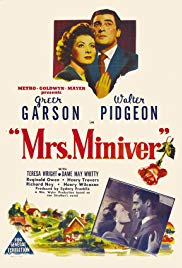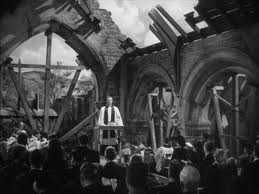MRS. MINIVER
SUBJECTS — World/England & WWII;
SOCIAL-EMOTIONAL LEARNING — Families in Crisis; Female Role Model; Courage in War;
MORAL-ETHICAL EMPHASIS — Trustworthiness.
AGE: 10+; No MPAA Rating;
Drama; 1942; 145 minutes; B & W.
There is NO AI content on this website. All content on TeachWithMovies.org has been written by human beings.

SUBJECTS — World/England & WWII;
SOCIAL-EMOTIONAL LEARNING — Families in Crisis; Female Role Model; Courage in War;
MORAL-ETHICAL EMPHASIS — Trustworthiness.
AGE: 10+; No MPAA Rating;
Drama; 1942; 145 minutes; B & W.
TWM offers the following movie worksheets to keep students’ minds on the film and to focus their attention on the lessons to be learned from the movie.
Film Study Worksheet for a Work of Historical Fiction
Worksheet for Cinematic and Theatrical Elements and Their Effects.
Teachers can modify the movie worksheets to fit the needs of each class. See also TWM’s Historical Fiction in Film Cross-Curricular Homework Project.

It is WWII. The Minivers, an otherwise happy and well adjusted English middle-class family, must learn to live under daily bombardment by German planes. Mr. Miniver joins hundreds of boat owners summoned to Dunkirk to help evacuate British soldiers from the mainland. While he is gone, a German flyer, shot down by British antiaircraft guns, seeks shelter in the Miniver home.
Selected Awards:
1942 Academy Awards: Best Picture, Best Actress (Garson), Best Supporting Actress (Wright), Best Director (Wyler), Best Black and White Cinematography, Best Screenplay; 1942 Academy Award Nominations: Best Actor (Pidgeon), Best Supporting Actor (Travors), Best Supporting Actress (Whitty), Best Film Editing, Best Sound, Best Visual Effects.
Featured Actors:
Greer Garson, Walter Pidgeon, Teresa Wright, Dame May Whitty, Richard Ney, Henry Travers, Reginald Owen, Henry Wilcoxon, Helmut Dantine, Aubrey Mather, Rhys Williams, Tom Conway, Peter Lawford.
Director:
William Wyler.
This is one of the best Allied propaganda films of World War II. It shows how the British public reacted to German aerial bombardment during the Battle of Britain (August – October, 1940). President Roosevelt was so impressed with the final speech in this film that he ordered it printed onto leaflets and dropped over occupied Europe.
MINIMAL. At the beginning, just before war is declared, the Minivers are shown recklessly buying luxuries they cannot afford. The friction between the English classes is glossed over.
Before watching the film, briefly describe the Battle of Britain and the evacuation at Dunkirk and their importance in WWII. See the Helpful Background section. Ask and help your child to answer the Quick Discussion Question. Then tell your child that this film is war propaganda for the Allies during WWII. Discuss propaganda and its use and misuse.
The Battle of Britain was a battle of air forces that lasted from August 8 to October 31, 1940. The Luftwaffe, with vastly superior air power, tried to reduce British morale and soften Britain’s defenses in preparation for Hitler’s planned invasion of England. At first, the Germans targeted shipping and the ports. Then they concentrated on bombing airfields and the Midland industries. Finally they tried to destroy London. The Royal Air Force (RAF) proved to be technically and tactically superior to the Luftwaffe. In the Battle of Britain, the RAF lost only 900 planes to the Germans’ 2,300. Lacking air superiority, Hitler was forced to abandon his plans to invade England.
Dunkirk is a seaport in Northern France. In late May of 1940, the British Army was trapped between the advancing German Army and the sea. The British Navy mobilized every available boat, public or private, on the English coast near the Channel, and evacuated 337,000 troops between May 27 and June 4, 1940. Dunkirk is seen as a brilliant military retreat. In the movie, Mr. Miniver participates in the Dunkirk evacuation.
Oxford University is one of the two most prestigious universities in England, the other being Cambridge. Only the best students are permitted to attend. These universities, their traditions and their fame date back to the Middle Ages. For a film about sports at Cambridge University see Chariots of Fire.
Beginning with the Norman conquest in 1066, a rigid class system prevailed in Britain. At the top was the king and the royal family, then came the aristocracy and finally, with the fewest rights, the common people. Over the 18th, 19th and 20th centuries, the British class system was dismantled and the political and economic stranglehold that the royal family and the aristocracy held over Britain was eliminated. Remarkably, this was accomplished without a violent revolution. The class systems in other European countries were more rigid than the English class system and were overthrown by bloody revolutions, e.g., the French Revolution (1792) and the Russian Revolution (1917). There was never a nationally recognized class system in the United States, except, perhaps, for slavery in the South (which also required a bloody civil war to eradicate). In the movie, the Belham family was the local aristocracy.
1. See Discussion Questions for Use With any Film that is a Work of Fiction.
2. Did Carol Belham do the right thing in asking Mrs. Miniver to convince the station master to withdraw Mrs. Miniver Rose from the competition?
3. Was Vin right in the way that he talked to Carol Belham the first time they met? What was his “social consciousness?”
No questions at this time.
1. Did Mrs. Miniver do the right thing by resisting the German soldier and putting her life in danger?
Discussion Questions Relating to Ethical Issues will facilitate the use of this film to teach ethical principles and critical viewing. Additional questions are set out below.
(Be honest; Don’t deceive, cheat or steal; Be reliable — do what you say you’ll do; Have the courage to do the right thing; Build a good reputation; Be loyal — stand by your family, friends and country)
This Learning Guide was last updated on December 16, 2009.